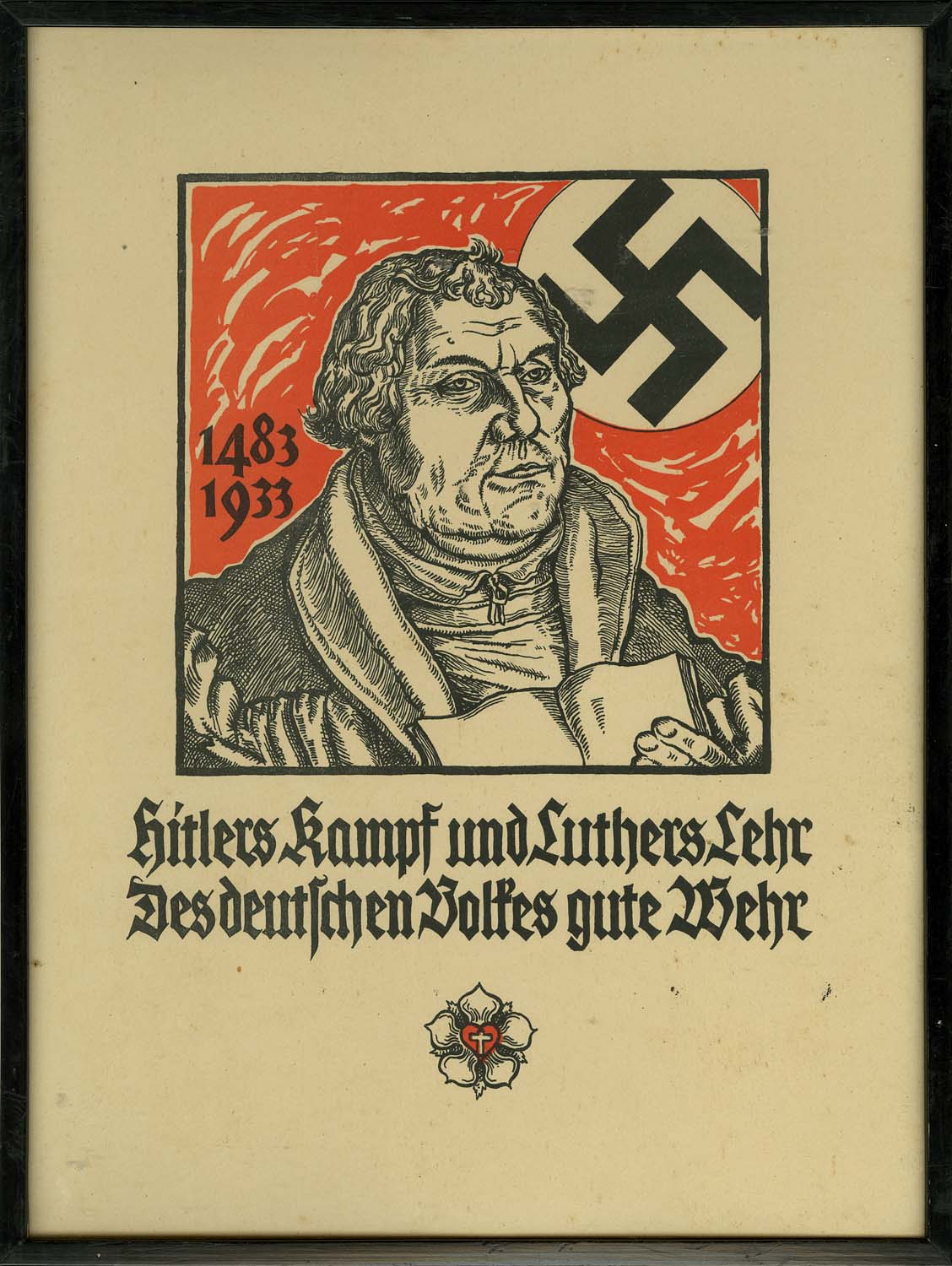In 2017 we are celebrating the 500 year Jubilee of the Reformation. It was in 1517 that Martin Luther posted his 95 Theses that marked the beginning of the Protestant Reformation , a schism in the Catholic Church which initiated profound and lasting social and political change in Europe. But it is also a moment for remembering the darker aspects of Luther's legacy. In this connection the Topography of Terror Foundation and the German Resistance Memorial Center are putting on an exhibition in Berlin that examines the importance of Martin Luther in National Socialist ideology. Luther was claimed by both the Nazis and their fascist Deutsche Christen movement and the Bekennende Kirche ("Confessing Church"), a resistance movement led by Dietrich Bonhoeffer.
"What was the Nazis’ position on religion and the church—and specifically on Martin Luther? How did Christians in Germany during the Nazi period deal with the reformer and his ”legacy”? And how did the relationship between church and state evolve during those twelve years? These questions are explored in the exhibition. While 1933 saw celebrations marking Luther’s 450th birthday, it also saw conflicts between the ”Confessing Church” and the ”German Christians.” References to Luther’s late anti-Jewish works increased markedly in the period up to 1938. Also during the Second World War, Luther was ”claimed” by various players: some to justify the war—others to back up their right to resist this unjust regime"
I am familiar with Luther's influence on Dietrich Bonhoeffer's theology – especially in his book Nachfolge ("Discipleship"). But Luther's impact on the Nazis was far more profound. Martin Luther's late work Von den Jüden und iren Lügen is a blueprint for Kristallnacht and reads like an issue of Julius Streicher's Der Stürmer – the Nazi anti-Semitic hate weekly.
Excerpt from Luther's Von den Jüden und iren Lügen
Unsern Oberherrn, die Juden unter sich haben, wünsche ich und bitte, daß sie eine scharfe Barmherzigkeit gegen diese elenden Leute üben wollten, obs doch etwas, wiewohl es mißlich ist, helfen wollte, wie die treuen Ärzte tun: wenn das heilige Feuer in die Knochen gekommen ist, fahren sie mit Unbarmherzigkeit zu und schneiden, sägen, brennen Fleisch, Adern, Knochen und Mark ab. Also tue man hier auch. Verbrenne ihre Synagogen, verbiete alles, was ich droben erzählt habe, zwinge sie zur Arbeit und gehe mit ihnen nach aller Unbarmherzigkeit um, wie Moses in der Wüste tat, der dreitausend totschlug, daß nicht der ganze Haufe verderben mußte. Sie wissen wahrlich nicht, was sie tun, wollens dazu wie die besessenen Leute nicht wissen, hören noch lernen. Darum kann man hier keine Barmherzigkeit üben, sie in ihrem Wesen zu stärken. Will das nicht helfen, so müssen wir sie wie die tollen Hunde ausjagen, damit wir nicht, ihrer greulichen Lästerung und aller Laster teilhaftig, mit ihnen Gottes Zorn verdienen und verdammt werden. Ich habe das Meine getan; ein jeglicher sehe, wie er das Seine tue.(I wish and I ask that our rulers who have Jewish subjects exercise a sharp mercy toward these wretched people, as suggested above, to see whether this might not help (though it is doubtful). They must act like a good physician who, when gangrene has set proceeds without mercy to cut, saw, and burn flesh, veins, bone, and marrow. Such a procedure must also be followed in this instance. Burn down their synagogues, forbid all that I enumerated earlier, force them to work, and deal harshly with them, as Moses did in the wilderness, slaying three thousand lest the whole people perish. They surely do not know what they are doing; moreover, as people possessed, they do not wish to know it, hear it, or learn it. Therefore it would be wrong to be merciful and confirm them in their conduct. If this does not help we must drive them out like mad dogs, so that we do not become partakers of their abominable blasphemy and all the their other vices and thus merit God's wrath and be damned with them. I have done my duty. Now let everyone see to his. I am exonerated.)
"Burn down their synagogues" - Yes, no wonder the Nazis embraced Luther.



2 comments
He also said to kill the peasants.
This is an ahistorical analysis.
Comments are closed.